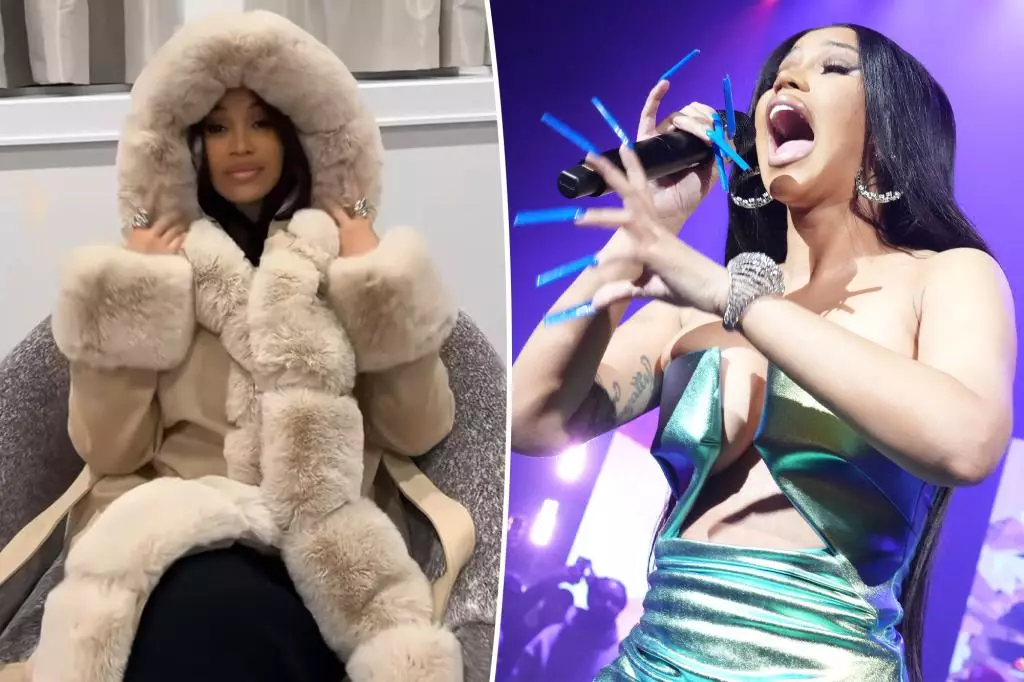Cardi B, the Grammy-winning rapper known for her phenomenal rise from humble beginnings to stardom, has recently found herself at the center of financial speculation. After sharing a sponsored post with fast-fashion brand Shein, fans began questioning her financial stability and her choice to partner with an affordable clothing line given her usual association with high-end luxury brands. In this article, we explore Cardi B’s response to these concerns, her financial acumen, and the broader implications of brand deals in today’s music industry.
Critics quickly assumed that participating in sponsorships with brands like Shein indicated that Cardi was struggling financially. Contrary to this narrative, Cardi decisively addressed the rumors in a voice recording shared on social media platform X. In a candid disclosure, she asserted her financial prowess by stating, “I could wake up tomorrow, sign a contract, and have half of $65 million or half of $70 million in my bank.” This powerful assertion allows us to understand that Cardi B’s financial standing is much stronger than some might perceive.
More than just a response to criticism, Cardi’s comments provide insight into the often-misrepresented world of celebrity finances. It is common for artists to have periods where they are not actively touring or releasing music, making sponsorships and partnerships not just opportunities, but sometimes necessities—for their own financial well-being.
The Cost of Living a Lavish Lifestyle
Beyond particular endorsements, Cardi opened up about her extravagant lifestyle, mentioning that she spends around $3 million in a month. While this may seem excessive, it reflects the realities faced by many artists: a unique balance of maintaining a larger-than-life persona while managing substantial financial commitments. Her lifestyle choices highlight the continuing pressure on celebrities to portray wealth, often at the expense of genuine financial security.
Additionally, a screengrab of a potential tour deal stored in Cardi’s messages raised eyebrows and served as further proof of her financial savvy. The negotiations hinted that she could earn $1 million per show, totaling $65 million, which she smartly postponed discussing until after the announcement of her next album. This strategy illustrates a calculated approach to capitalizing on her brand’s strength while managing expectations during an “off year.”
Strategic Branding and Its Implications
In this era of social media and branding, celebrity partnerships with brands like Shein can be misunderstood. Cardi, who has consistently pointed out her preference for moving strategically, emphasized the importance of timing in her career. By waiting for the right moment to announce her next album, she understands that she could leverage more favorable deals that reflect her value as an artist.
Criticism from fans often stems from a disconnect between perceived authenticity and the commercial realities of brand partnerships. Cardi B’s rise to fame was rooted in her relatable persona—she often embraced budget-friendly fashion, which endeared her to fans before her climb into high fashion. Her history of collaborations with budget brands such as Fashion Nova serves as a reminder of her humble beginnings and how she has evolved while still connecting with her fanbase.
The reaction to Cardi’s Shein partnership sparked a mix of criticism and support among fans. Some questioned her credibility as a luxury brand ambassador, arguing that her past with high-end fashion contradicted her current endorsements. Others defended her, reminding critics of her genuine start with affordable options. This dichotomy underscores a fundamental truth about celebrity culture: while followers expect lavish displays of wealth, many still appreciate an artist who remains accessible and relatable.
The balance Cardi strikes between luxury and affordability reflects a broader trend in celebrity brand engagement, revealing a nuanced relationship between stars and their audiences. Her choice to represent Shein—despite its affordability—encapsulates an important lesson in consumer culture. Cardi embraces the notion that quality and value can coexist, regardless of price points.
Ultimately, Cardi B’s response to the financial speculation highlights the intricate reality of being a public figure in today’s society. She reminds audiences that wealth is not merely about brand collaborations or flashy lifestyles; it reflects strategic moves and informed decisions in the complex world of celebrity finances. As artists navigate the trajectories of their careers, lessons about resilience and branding are essential for sustaining and growing their influence in an ever-changing landscape.

